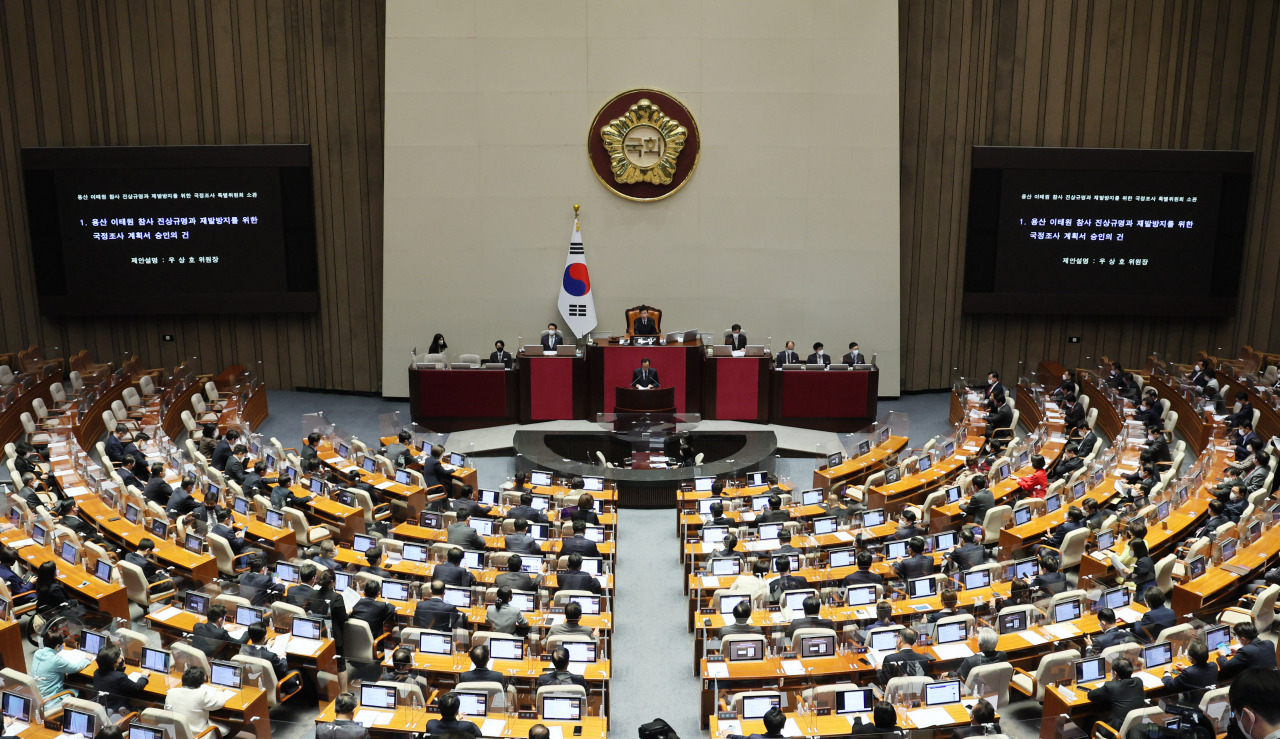 |
Parliamentary probe of Itaewon disaster kicked off on Thursday. (Yonhap) |
The National Assembly investigation into how the response failed in the deadly Halloween crowd crush in Seoul’s Itaewon began on Thursday, after the ruling People Power Party backed out of meeting at the last minute.
The party demanded that the agreement -- reached just one day prior -- be revised to exclude the top prosecutors’ office from being investigated.
The plenary session, postponed two hours amid the squabbling, however, voted in favor of the plan investigating the Supreme Prosecutors’ Office divisions on drug crimes.
The Democratic Party of Korea has argued that the prosecutors’ recently declared war on drugs may have distracted the police from focusing on public safety.
“The ruling party is now saying that the prosecution's drug crackdown has been going on long before the Itaewon disaster, and they don’t see the connection,” Democratic Party Rep. Kim Kyo-heung told reporters outside the conference room where the meeting was to take place.
On making the Supreme Prosecutors’ Office face investigation, the Democratic Party Floor Leader Rep. Park Hong-keun told reporters Tuesday that it was “necessary to clarify how police powers were deployed in the drug investigations.”
But some experts say the prosecutors’ crackdown on drugs would not have influenced how police handled the response in Itaewon.
“I don’t think it makes sense to link the prosecutors’ investigations into drug crimes to the disaster in Itaewon,” Jeong Woong-seok, president of the Korea Society of Criminal Procedure Law, said in a phone call with The Korea Herald.
“There is no room for prosecutors to intervene in how police forces are placed in the community, nor do they have the authority to dispatch police to public safety events. So I don’t see the logic in questioning the prosecution office’s drug investigations.”
He added that the Democratic Party’s calls to investigate the Supreme Prosecutors’ Office -- which is investigating the party’s chair, Rep. Lee Jae-myung, and his aides over a controversial real estate deal -- appeared to be “driven by political intentions.”
Oh Yoon-sung, a professor of police studies at Soonchunhyang University, agreed that the line of responsibility “does not stretch to the Supreme Prosecutors’ Office” in the case of Itaewon.
“It has nothing to do with the prosecution service or its drug bust,” he told The Korea Herald. On the lack of police presence in Itaewon on the night of the disaster and its possible association with prosecutors, he said the prosecution office “has never had that kind of control over the police.”
He said the key suspicion seemed to be why police at the scene had delayed reporting the situation to their superiors, and failed to take action immediately.
“It happened in Yongsan, so that falls within the Yongsan district police’s jurisdiction,” he said. “Yongsan police are under the command of the Seoul metropolitan police, which in turn is under the command of the national police. That’s the primary line of responsibility.”
Lawyers for a Democratic Society, or Minbyun, which is working with the families of some of the victims, said that the parliamentary probe should be scrutinizing all of the steps taken by all of the authorities involved before and after the disaster.
“The prosecutors conducted the postmortem examinations on the victims for instance, so looking into what they had done should not be a problem,” Suh Chae-wan, a Minbyun lawyer, told The Korea Herald.
He declined to comment on the alleged role of the drug crackdown in the disaster. “We don’t have anything to say on that front.”
By Kim Arin (
arin@heraldcorp.com)








